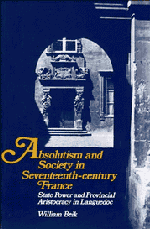 Absolutism and Society in Seventeenth-Century France
Absolutism and Society in Seventeenth-Century France Book contents
- Frontmatter
- Contents
- List of tables
- List of figures
- Preface
- List of abbreviations
- Map: Languedoc in the seventeenth century
- PART ONE INTRODUCTION
- PART TWO THE DISTRIBUTION OF AUTHORITY
- PART THREE THE PROVINCE ON ITS OWN
- PART FOUR THE PROVINCE AND THE CROWN
- Conclusion
- Appendix: Breakdown of taxes from the diocese of Toulouse, 1677
- Select bibliography
- Index
- Frontmatter
- Contents
- List of tables
- List of figures
- Preface
- List of abbreviations
- Map: Languedoc in the seventeenth century
- PART ONE INTRODUCTION
- PART TWO THE DISTRIBUTION OF AUTHORITY
- PART THREE THE PROVINCE ON ITS OWN
- PART FOUR THE PROVINCE AND THE CROWN
- Conclusion
- Appendix: Breakdown of taxes from the diocese of Toulouse, 1677
- Select bibliography
- Index
Summary
This book is the product of many years' effort to grasp the special quality of government in seventeenth-century France and its relationship to the social system. The seventeenth century saw fascinating shifts away from a France of particularist dissidence towards a more centralized monarchy, but the essence of the change has not yet been successfully captured by historians. Standard generalizations like the decline of provincial liberties, the rise of personal government, the domestication of the nobility, and the use of a regime of commissaires to supplant one of officiers are abstractions based on a certain conception of the modern state which fail to come to grips with the special nature of authority in the seventeenth century. More important, they fail to deal with the question of class interest.
I set out, therefore, to explore the anatomy of absolutism by studying the system in action in one manageable region, Languedoc. I discovered rapidly that I was pursuing two distinct and somewhat contradictory purposes. The first was descriptive: to recreate the atmosphere of the various governing institutions, whose distinctiveness would be an essential part of any understanding of the nature of the system. The second was analytical: to explore the collective rule of these individuals and agencies as part of a system with social implications. But description requires attention to specific cases, while analysis calls for comparative treatment and interaction.
- Type
- Chapter
- Information
- Absolutism and Society in Seventeenth-Century FranceState Power and Provincial Aristocracy in Languedoc, pp. xii - xvPublisher: Cambridge University PressPrint publication year: 1985
